#religious myth
Text
Tear down the Firmament
Force Paradise to be
In this hellscape
Of Creation
.
.
.
Let the Righteous gaze upon
What their past lives
Have wrought
#my writing#poetry#poem#creative writing#Tales from Alsahra#religion#religious myth#rage against religion#poem from my fiction#fictional poem#fantasy#sci fi and fantasy#fantasy poem#fantasy world#spilled ink#poets on tumblr#writers on tumblr#writers and poets#quick write
13 notes
·
View notes
Text
Concept: the justice league finds out that Blaze and Satanus, the rulers of hell, are kids of their ‘even more of a boy scout than Superman’ coworker’s “boss” and think Shazam is the Christian God. They ask Billy really vague questions that lead Billy into confusing them even more and they become convinced that Marvel’s Wizard guy is God with a capital G and Marvel’s either an angel or the second coming of Jesus.
Meanwhile Shazam doesn’t even know what the Bible is and his knowledge about religion is so outdated he still thinks Solomon’s Judaism is new age and not worth his time to research such a ‘fad’ religion, but he knows humans will make a religion out of anything as well as bastardize existing ones and very well could have mixed up actual tales that involve him, his allies, and his children into some sort of melting pot of a religion.
So when someone finally asks Marvel outright if his “boss” is God, Billy goes ‘wait… old guy in white robes and sandals, with long white hair and a beard… lives in space… aka the “heavens”, whose a ghost(Holy Spirit), and knows everything(historama)??? I need to dig deeper into this hold on guys’ and goes off to ask the wizard.
So when Billy asks the Wizard he just tells Billy “well, my boy, if so many things match up, maybe it is so and the tales of myself and my champions grew so estranged from their origins or mixed in with other beliefs that it can explain the things that aren’t true to our reality.”
Then The Canonical Character To The DC Universe, Jesus of Nazareth, shows up.
#billy batson#shazam#dc captain marvel#dc comics#I really like religious history and folklore and that’s sort of what really got me into Shazam#Fawcett and DC’s interpretations are all so weird and conflicting just like actual religious history lol#I think comic books really capture the essence of the ancient myth very well#there’s so many different interpretations of a character with conflicting lore and so many writers across the decades#Batman: for the LAST FUCKING TIME our coworker is NOT Jesus#Guy Gardener: The man fights demons called The Seven Deadly Sins and follows orders from some guy he says lives in space also isn’t in spac#Guy: what the fuck else are we supposed to think?
206 notes
·
View notes
Text
Phemonoe, the Pythian priestess on why the Delphic oracle has grown silent:
"...or perhaps Apollo, determined to exclude the guilty from his shrine finds none in this age worthy of opening his closed lips."
- Lucan, Pharsalia (Trans. A. S. Kline)
...
Internal screaming
#Apollo#Phemonoe#Pythia#guys this has changed something in me#Gods not interacting with the humans anymore in this age because of the corrupt nature of humanity#is something that's common in my religion too#(well the myths of my religion to be specific)#not that I'm too religious#but it's cool to see similar concepts in Greek mythology and Hindu mythology#especially since they're often quite different from each other conceptually#Apollo info#mine#Lucan
152 notes
·
View notes
Text
Homophobe: Jesus hates f@gs!
Achilles: Okay lmfao does it look like igaf
Jesus: No, guys, I said I hate figs.
Achilles: You fucking what.
#i’m not religious#but i had a vision#greek mythology#greek myth#mythology#madeline miller#patrochilles#tsoa madeline miller#the song of achilles#tsoa#tsoa patrochilles#tsoa achilles#achilles#lgbtq
142 notes
·
View notes
Text
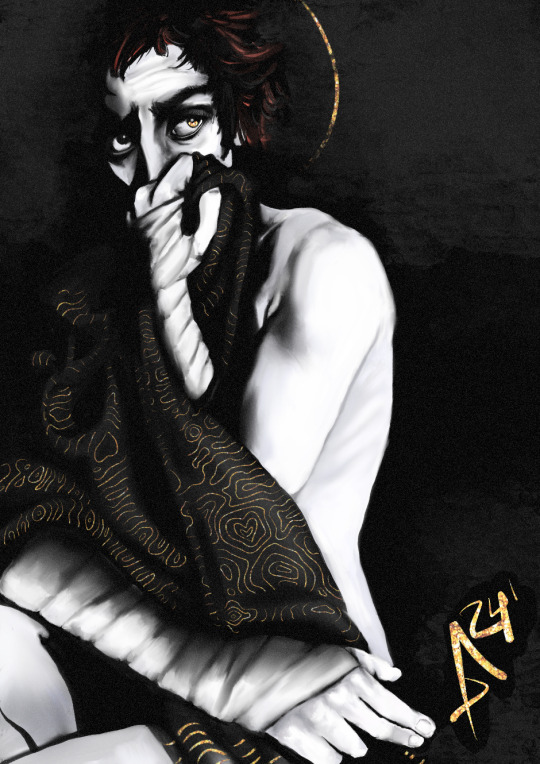

Final Piece vs. Inspo (photo of Tim Curry from The Rocky Horror Picture Show)
"Unintended Consequences"
I know this isn't one of my usual colorful/maternal/smarmy/tricksy/domestic styles of Loki portrait. And I still don't know if this is after the lip-sewing, between the Binding and Naglfar, or some other time of fleeing/grief/fear/etc, but it was kinda cathartic to paint.
Follow me on Ko-Fi for WIPs, BTS commentary (not the band) and more~ 💖
#loki#loki deity#myth loki#heathen#norse pagan#paganblr#heathenry#norse paganism#lokean#germanic paganism#devotional art#religious art#paganism#polytheism#art witch#norse mythology#norse deities#norse gods#norse loki#witchblr
83 notes
·
View notes
Text
Question has anyone here ever read the iliad and if so was it difficult to read? For context i reread the song of Achilles today and i want more of these characters, but i'm afraid it'll be too challenging bc it was translated from old greek i think and english is not my first language (but also i refuse to read anything in dutch lest i recoil every time someone uses the informal dutch you)
#not atla#dori rambles#the iliad#for some reason i am also quite interested in reading the english translation of the bible. not for religious purposes#i regard that book the same as any greek myths tbh
28 notes
·
View notes
Text
A Taste of Heaven
I read for you,out loud
in a room with yellow light
and I stutter at every other word.
You don’t seem to mind it,
my stutter or my nervousness,
so I don’t stop. You don’t tell me to.
It’s the first time anyone has been this gentle.
I lay twisting in my white sheets,
flowers around my head like a halo,
thinking of eyes the colour of a blossomed Eden,
a garden one only dares to imagine when they dream.
A shade of green that rivals my jealousy,
a shade of green that could ruin a person’s life.
I read for you,out loud,
all the poems that have shaped me,
all the books i’ve loved and cherished
and kept close to my heart
like a treasure,like a locket.
You don’t seem to mind me,
so I don’t stop.
I scratch your arms until they turn pink,
hoping to feel some sort of satisfaction
or maybe a touch of guilt.
Ending up feeling like I cut an angel’s wings off and then pushed them off a cliff.
My humanity gets the better of me.
I ask if you are in pain.
You always say no.
You never,ever stop me.
Even when my wanting nearly kills me,or you,
or both of us,sometimes,
even when I nearly choke with it,
your name like a hymn on the edge of my tongue.
If you touched me it would come out in the disguise of a cry.
I call and you always answer,
our eyes meeting effortlessly everytime we are in the same room.
Your jewels hold secrets only I can unravel. I don’t want to.
I like you for the mystery you are,
like a scenery hidden by mist,
like the debths of the ocean,
like the magical forests that only exist behind waterfalls.
I like you for the mystery you are,
like the seven wonders of the world,
like life after death,
like God.
I read for you,out loud,
parts of the Gospels,
parts of my truth.
And silently I hope for a heaven that looks just like this:
eternally blossomed gardens
and angels that let me read aloud
and feed my curiosity with their curious,mysterious eyes.
Silently, I pray:
If this is what happiness feels like,
please make it last and last,
forever.
#literature#original poem#phoebe bridgers#poem#poems on tumblr#poetry#notes#prose#spilled ink#spilled poetry#religious imagery#religious poetry#green#myth#art#my writing#love
28 notes
·
View notes
Text









stimboard for : a fallen angel with a sea theme including dark/eerie aesthetics, glowing stuff, and statues in mostly blues and greens
x | x | x
x | x | x
x | x | x

#💫stim#💫for you#💫blue line | queue!#fallen angelkin#fallen angel kin#angel kin#angelkin#kin request#kin stuff#mythkin#myth kin#wingedkin#winged kin#cw religious themes
54 notes
·
View notes
Note
THE ANTLERS ON YOUR GEMINI DESIGN ARE LITERAL PERFECTION-
-Stardust
ABAUAHAUSHSD THANK YOU!!!!! I had the vague silhouette idea for a sort of angelic tarot card sort of look w/ Gemini?? And I felt pike I had to add something to fill out the "halo" look and then I was like OUHG. ANTLERS......
Like this!!! If i makes any sense HSJWBSJS

#asks#anon#stardust anon#xero creations#i saw a post where they used a deer as religious imagery and technically it was bc of the author's own personal experience#but also like. i feel like i've seen a lot of media where deer or deer-like figures are used to signify you are seeing smth More Than You#princess mononoke comes to mind with the forest god. yk? antlers are like built-in halos 2 me and i just. AUGH. i wanted to make-#-gemini more visibly Off. like they'd be smth that people tell myths about if they ever saw them. yk???#lunar and earth show#the lunar and earth show#tlaes#tsams#laes gemini#gemini laes
29 notes
·
View notes
Text
Dionysus: "And what has our dear sister, our girl of the wild, been up to?"
Apollo: "I assume you mean Artemis. She's on maternity leave."
Hermes: "Um, wow, what made her change her mind all of a sudden?"
Apollo: "Not what you're thinking. She's bottle feeding a litter of orphaned kittens she found and adopted."
Dionysus: *grabs two bottles of wine* "Let's go, boys. We know she's going to need these like now."
#religious humor#incorrect greek myths#incorrect mythologies#incorrect gods#incorrect quotes#divine brothers#the three stooges#sons of zeus#hellenic pantheon
180 notes
·
View notes
Note
hebert had a wife and daughter?
Indeed he had!
Hébert’s wife’s name was Marie Marguerite Françoise Goupil. I haven’t found better information regarding her birth more than that it happened in Paris in ”the first days of 1756” (she was in other words one year older than her future husband). I also haven’t found out which of her three names was her first name, though all texts I’ve checked settle on Françoise, so I’m also going to call her that.
Françoise, according to Paris révolutionnaire: vieilles maisons, Vieux papiers (1903) was the only child of Jacques Goupil and his second wife Marie-Louise Morel. The former had been the owner of a not very successful lingerie business which his wife then took over after his death. When Marie-Louise died as well, on July 16 1781, she had for a while lived with and worked as a nurse for the abbot Vaudair, who it is possible her daughter then turned to when she a while later started working for religion. Françoise became a nun of the Couvent des Filles de la Conception on rue Saint-Honoré, the same convent where Élisabeth Duplay claimed she and her three sisters took their first communion.
In June 1790, municipal commissioners presented themselves at the convent to hear its inhabitants’ declaration on whether they would stay there or leave. Out of the 24 nuns, only Françoise responded that ”she could not make up her mind at the moment,” the other 23 declaring that ”faithful to their wishes, they wanted to live and die in their state as nuns.” A year later, July 1 1791, Françoise’s name no longer featured among the convent’s inhabitants, meaning she had left it, be that out of free will or her sisters kicking her out for what she had said the previous year.
Hébert’s fellow journalist Louis Marie Prudhomme claimed in his l’Histoire générale et impartiale des erreurs, des fautes et des crimes commis pendant la Révolution (1797) that it was while at La Société Fraternelle des Patriotes de l'un et l'autre sexe Françoise for the first time met her future husband. Their wedding was held in the parish of Saint-Gervais on February 7 1792 (see the image below). After the marriage, the couple settled on Rue Saint-Antoine.
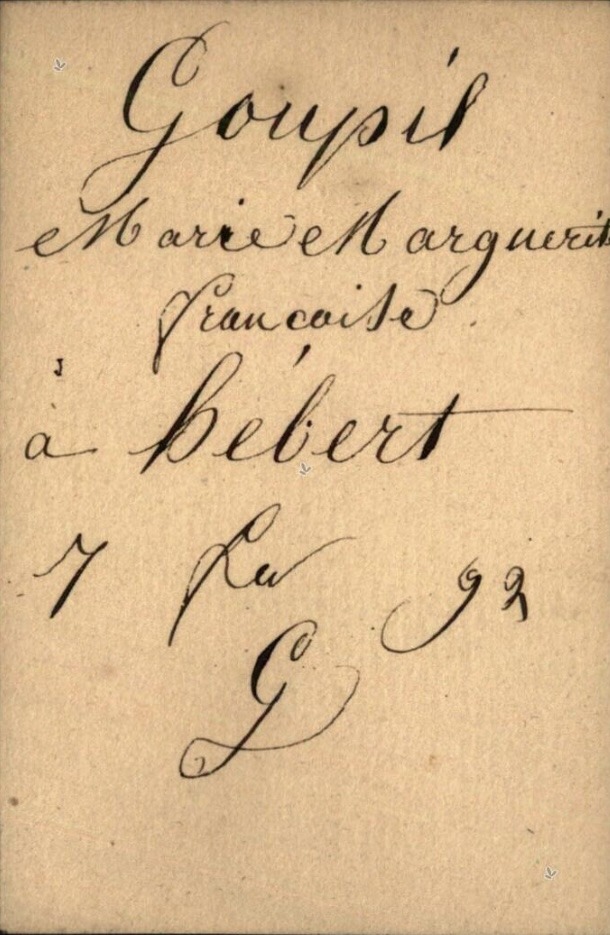
According to the same Prudhomme, Hébert was however not heads over heels in love with his wife:
[Hébert] married more to appear to have carried out an act of good citizenship than out of esteem and love for his wife. Nevertheless, they got along quite well, although she was ugly. It was a large spider that came out of the convent of the Assumption or the Annunciation. […] A wonderful revolutionary frenzy took hold of the couple, and they were faced with the people, who shouted bravo!
Hébert’s own letters would however appear to contradict this:
My situation, although difficult given the immensity of occupations with which I am responsible, becomes happier every day. I must inform you, my good friends, of the alliance that I am contracting with a very amiable young lady of excellent character. It would be enough of these advantages and were she devoid of all resources, the one I love would not be any less dear to me; but to fill my happiness I find enough fortune with my wife to be reassured about her fate if death separates us. I therefore ask you, my dear sister, to give me your approval and to ask the same from Boissierre. […] I am very assured that you will sympathize with my lovable pretender. She is very spiritual. Speaking in the old style I would say that she is comme il faut, but as I have been assured that you are as patriotic as me I only use constitutional expressions. This demoiselle is called Goupil: she has spent her entire life in the convent up until now. By her personal qualities and by the advantages she enjoys she could claim to someone much richer than me; but my good fortune gave me preference over several competitors. You see, my good friend, that not everything in life is bad and that fate has finally tired of persecuting me and through consistency I have been able to create a pleasant and lucrative position for myself.
Hébert in an undated letter to his sister, written somewhere in 1791
I am healthy and very happy. United with a woman who combines all the good qualities with the charms of the mind, whose education is completed, whose character is perfect, I lead the sweetest and most peaceful life.
Hébert in an undated letter to his sister, written somewhere in 1792
Réné Desgenettes, who in his memoirs claimed to have met Hébert in late 1791 (though it was most likely early 1792) also hints at a loving relationship:
After my return to Paris, by the end of 1791, I had met at la Grave, or rather under the Saint-Jean arch, my fellow patriot and almost fellow student Hébert, who showed me with satisfaction his feelings over seeing me again, how much he had often regretted that I had been absent from the capital during the first days of the revolution.
”You would have surely played an important role,” he told me, ”but now that you’re here everything is almost over. I live pretty close to this place, rue Saint-Antoine, opposite the passage of this name, which leads to rue du Roi des Deux-Siciles. My little apartment is on the third floor at the front. I have not at all forgotten your constant kindness or what I owe you. I want to speak of money so generously lent, because I would not dare to recall and could not count how much you often gave me at the traitors of the rue de la Parcheminerie, de Mâcon and de la Grille du Carrousel. Without you and the honest patriots from rue des Noyers, I would have starved to death… I can’t say, monsieur, which hours I will be at home, where I still dine everyday, and where I would consider myself both happy and honored to find you. But you will be sure to always find my wife there, because I’m married. Madame Hébert is a former nun from Conception-Saint-Honoré, young and very spiritual. Despite her burning patriotism, she has kept a lot of piety, and considering I love her so much, I never contradict her on this point, contenting myself with a few jokes.” I never answered to this invitation, nor did I find the occasion to see Hébert again after the end of 1791.
From the summer of 1792, we have two letters Françoise wrote to her husband’s sister, which they too seem to indicate a happy marriage:
To mademoiselle Hébert the older in Alençon
Paris, 24 July 92
We were firmly convinced, my husband and I, that you received the newspaper as well as Mr. Desnos. M. Hébert had taken all the necessary means for this; but we had the misfortune of associating ourselves with the biggest rascal in Paris, who deceives us in every way. It is therefore not surprising that you were deprived of the papers he was responsible for sending you. We are ready to leave him and you will receive what you want without fail, I hope. We would already be on top of our affairs without this man, hardly worthy of a partner as upright as my husband, who has been fooled ever since he started working; but whose well-known probity and frankness made an infinitely honest young man desire his association. So we will work through new charges and I hope that this time we will not be unsuccessful. If M. Hébert is good enough to make his happiness consist in having me, it is indeed me, mademoiselle, who without grace can certify that I am perfectly happy with he who never ceases to everyday give me new proofs of his tenderness. I have carried a precious token of him in my belly for three months now, he wants the child to look like me, and I want it to look like its father, this, mademoiselle, is the continual subject of our differences. We agree more willingly on the desire to have you as a witness of our love, it will not be up to us unless it happens soon. You are very worried about the dangers of the fatherland. They are imminent, we cannot hide them: we are betrayed by the court, by the leaders of the armies, by a large part of the members of the assembly; many people despair; but I am far from doing so, the people are the only ones who made the revolution. It alone will support her because it alone is worthy of it. There are still incorruptible members in the assembly, who will not fear to tell it that its salvation is in their hands, then the people, so great, will still be so in their just revenge, the longer they delay in striking the more it learns to know its enemies and their number, the more, according to me, its blows will only strike with certainty and only fall on the guilty, do not be worried about the fate of my worthy husband. He and I would be sorry if the people were enslaved to survive the liberty of their fatherland, I would be inconsolable if the child I am carrying only saw the light of day with the eyes of a slave, then I would prefer to see it perish with me. I gave Mde Pelletier the papers for you that I haven't through up much since M. Desnos left.
I have the most ardent desire to see you.
Mademoiselle and dear sister
Your very humble servant
Goupil… Hébert
My husband tenderly embraces you as well as your sister, whom I beg you to accept the assurance of my very sincere feelings.
To Mademoiselle Hébert the older.
Rue de la Mairie, Alençon, département de l'Orne.
Mademoiselle and dear sister-in-law,
I don't know what to attribute your long silence since last time I had the pleasure of writing to you; but it surprises and distresses me, I would have already complained if my since five months back very bad health would have left me that possibility. My husband, who was chosen by his section to serve as city commissioner on the night between August 9 and 10, has run the greatest of risks. He had the pleasure of rendering services to his fatherland, and always with that noble disinterestedness that you know from him. He has done and still does good without respite, he has seen and still sees intrigue rise up, and modestly remains Père Duchesne, a poor newspaper seller. He stood for election and was undoubtedly well worthy of becoming a member of the Convention; but he believed he had to hide nothing of the truth, more than once he made the intriguer who enjoyed a great reputation turn pale, he seemed too pure and too formidable to those who had influence in the nominations, and to the great astonishment of the brave sans-culottes, he himself is still a brave sans-culotte, which is enough for my happiness. Satisfied to know my husband was worthy and capable of doing anything to be satisfied, his hands remained pure like his soul and were not soaked in the blood that flowed in the prisons. For my part, I suffered from such a great horror that I almost lost my life; I believe that the law alone can strike down the guilty, and until then I will cover them with my body. All that can console me in this tragic event is that the names of those who are its authors are already in execration and that history by transmitting them to posterity will justify the people of Paris who has lost nothing (it must be said) of its urbanity. You would oblige me infinitely if you could tell me if the former Viscount the huntsman Lord of Carrouge has emigrated. I suspect that he has and if I was certain of it I would put an opposition against his property as he owes le 600 livres. My husband, who loves you very tenderly, says a thousand tender things to you and to your sister, and I ask you to believe me, both of you, with a very sincere attachment.
Mademoiselle and dear sister-in-law .
Your very humble, .
Servant G... HÉBERT.
My address from now on will be:
Cour des Miracles rue de Bourbon Ville Neuve.
A few months later, Réné Desgenettes claimed to have run into Hébert and been invited to dinner yet again, and this time he did follow through with it, resulting in this very long anecdote:
On February 24 1793, I spotted him, on rue Saint-Honoré, part of the procession bringing the remains of Pelletier de St-Fargeau to the Panthéon. […] Hébert, who had noticed me as well, dispatched himself from the group, approached me, shook my hand roughly and said: ”Where in the devil’s name do you live?”
”Rue du Paradis au Marais, n. 3.”
”I have important things to tell you and still live on rue St-Antoine.”
I still refrained from visiting Hébert. However, after a very few days, I learned that a gentleman of fairly good appearance, well dressed and calling himself substitute deputy of the Commune, had come to ask for me, and that he seemed upset for not having met me. Thinking there was no way to back down, the next day, around five o’clock, I went home to Hébert, where I found his wife, the former sister Goupille [sic], who, while waiting for her husband, occupied herself with preparing a rather delicate dinner, because the orator loved good food. Madame Hébert received me very well and told me her husband so many times had spoken of me with affection, that we were two old acquaintances. I approached to contemplate an engraving based on the beautiful painting by Titian or Paul Veronese, showing Jesus Christ with two of his disciples at Emmaüs’, when I noticed that Hébert below it had written: the sans-culotte Jesus dining with two of his disciples in the castle of a ci-devant…
”Here you see,” Madame Hébert told me, ”one of these bad jokes my husband often allows himself to make against religion, as a result of a detestable habit I have no hopes of curling him from... I am, monsieur, very much attached to Christianity… It’s our religion at its most beautiful, because I don’t subscribe to everything… I preach to the Jacobins, in the society of our sisters, the same doctrine that abbot Fauchet preach to our brothers at their reunions. He is a great and true apostle who inspired me with a perception of the enthusiasm which animates him, and I have reason to believe that he is also not dissatisfied with the zeal with which I seek to imitate him. I know all the advantages that the Bishop of Calvados has for me; he owes them to nature and to his superior talents, because he is a very handsome man, and everyone agrees that he is also very eloquent.”
Hébert arrived at six o’clock. Before sitting down at the table, where we then stayed for three hours, he took from a secretary a certain number of gold francs, which he handed over to me like an old debt with a thousand thanks. […]
Let us [said Hébert] speak a bit about Alençon and the first time of our youth. Madame Hébert will see that I have hidden nothing from her about the time of my life when it has been claimed that I was a scoundrel. You surely remember, monsieur, that upon leaving college, where I quite simply had the well-deserved reputation of being lazy and mischievous, I had the misfortune, or perhaps the good fortune, to fall out with la justice?
R.D.G: I remember it well.
Madame Hébert: But that is always very grave.
Hébert: This was also very grave, because the bailiwick of Alençon condemned me to banishment; but I appealed to the parliament of Rouen, which did not confirm the sentence of the first judges.
Madame Hébert: I’ve only ever known of this in a rough and very imperfect way.
Hébert: Well, you will know, my good friend, that in the town where monsieur and I were born, women have always had a great reputation for gallantry. Now the widow of an apothecary, who had been accused of bigamy, had in turn many lovers. In the front line there was a doctor who was very handsome, and after him, living under the same roof as the lady, was her premier garçon, as they expressed it then, and then finally the man who managed the very busy pharmacy. A rivalry which existed secretly between the doctor and the pharmasist broke out one day with so much fury that the doctor murdered his rival...
Madame Hébert: The horror! How did he kill him?
Hébert: The doctor took an iron or copper pestle, and delivered several strong blows to the head and across the face of my poor friend L..., who was on the point of being trepanned. However, even before public rumor got around, the king's prosecutor was seized as suspect in this criminal matter, it was dormant or rather stifled by a transaction which was attributed throughout the city to the conciliatory spirit of M. Desgenettes, your respectable father. Doctor Cl.... however, had aggravated his crime, because he was closely pursued, it is true, sword in hand, by the brother of L..., employed on the farms, he had tried twice to kill him. Outraged with rage upon learning that just revenge was going to elude the L... brothers and their friends, I drew up a note which was posted at the doors of the main church, the commissary, the courts and other places.
Madame Hébert: What did it say on the note?
Hébert: It said: ”Sentence rendered to the Supreme Court of Honor which condemns Doctor Cl... to the pillory of infamy, for compensation, etc. Then I drew two bloody knives in a saltire, with this motto: Olim veneno, nunc cultro.”
Madame Hébert: Which means?
Hébert: Formerly with the poison, now with the knife.
Madame Hébert: Is that right, M. Desgenettes?
R.D.G: Yes, madame, and if you want a different version: ”He has replaced the knife with the poison.” Nevertheless I must have the honor of observing to you, as your husbands already knows, that the doctor did not use the knife.
Hébert: The knife made Cl... more odious, and that's what I intended. The assassination is therefore tolerated by a court which had just hanged two unfortunate people, for having burglarily stolen forty sous from a church trunk, which I would happily call provocative, since it jutted out onto a main road. The veil of oblivion is extended over a crime that was to be punished by the torture of the wheel, and here I am, for a placard which repaired the wrongs of justice, extraordinarily prosecuted, and decreed for personal adjournment . This is not yet enough, and both God and the devil are invoked against me.
Madame Hébert: You are aware, my friend, that all justice emanates from God; but the possible intervention of the devil in a judgment rendered by men is a superstition that I reject, although you have sometimes regarded me as superstitious. Monsieur, she said, addressing the author of these Memoirs, I am not superstitious, but no one is more penetrated than me by the power of God and the ineffable benefits of the religion of Jesus Christ... Is it not the Savior who said to men: You are the children of the free woman? I have never blushed over my [connection to] the first estate, and admit it in front of everyone. I still keep, and you have it before your eyes, the bed that I had at the Assomption; when it becomes that of a mother, it will change in neither shape nor color... My principles are still the same as those of Sister Goupile [sic]. But, tell me, Hébert, please, how was Satan brought into your business?
Hébert: Because it was brought before the official of Seez, and the general vicar and canon of the cathedral, who presides over this ecclesiastical tribunal, launched a monitory against me. This act fulminated in the sermon in the parish church of Notre-Dame d'Alençon, with an apparatus and ceremonies borrowed from the inquisition, which filled the common people with terror, and part of the population barricaded themselves in their homes, at the the onset of night, while the proud men of the city, and especially the armed butchers, searched everywhere for the werewolf. You know, monsieur, that they are a brutal and even ferocious type of man. The fanaticism of butchers has long been maintained in our city, by making them appear with their cleavers and their dogs in the procession of the little Corpus Christi, in memory of the assistance they had given, in 1500, to the Catholics against the Calvinists, then very numerous and very powerful in our country. Do you remember, monsieur, seeing this ceremony?
R.D.G: Yes, monsieur, and to have seen at the head of the butchers, with his sword raised and his arm bare, a Malêfre. This gentleman who, I believe, lived in Seez and had a stronghold at the gates of Alençon, was descended from the one who first commanded the butchers in this ceremony. The dogs had been removed, because they bit those of the assistants who stepped on their feet, and because they howled in a terrible manner when the culverines of the castle came to shoot to salute the Blessed Sacrament.
Hébert: If the butchers, who were pleased by my known cheerfulness, had suspected me of being the author of the placard, I would have been very uncomfortable, and if they had been convinced of it, I would perhaps have been treated like the werewolf that they wanted to skin like a calf... Barricaded at the house of my poor mother, who borrowed books for me from all directions, I acquired this profound knowledge of history that deigned to grant me. My misfortunes in Alençon, repaired a little in Rouen, led me to Paris, and you know, very roughly, what the rest of my life was like.
Madame Hébert: It was during your debut in Paris, my dear friend, that you were the most silent…
Hébert: However, I had no reason to keep silent about the fact that for a long time I had struggled with the devil by the tail, even up to the time when I obtained a small job as a tobacconist at the Théâtre des Variétés. Yes, I suffered from hunger, thirst and cold for a long time. You are not unaware of the services rendered to me by Monsieur; I also had many obligations to the Parisot hairdresser on rue des Noyers, as well as to his wife. This graceful couple reminded us of the wigmaker, the Love of the Lutrin, and his wigmaker... We still had charming neighbors, the two daughters of the butcher across the street from Saint-Jean-de-Beauvais... Then, close to that of the English, this woman who loved you so much...
Madame Hébert: Is it so, monsieur, that you also have a good friend (girlfriend) in the quarter?
R.D.G: No, madame, but I often chat with a rather laughable old woman, who ran a tobacco shop and housed two or three students. The house, which was no more than fifteen feet wide, as deep, and yet five stories high, had belonged to the father of J.-B. Rousseau, who was born there on April 6, 1671. The good woman in question, who daily and naively repeated that she had once been young and had always haunted minds, had written on her door: This is where Rousseau was born.
Arriving quickly at the first days of the revolution, Hébert began to talk about how he had determined to write in a genre which was neither in his taste nor in his habits, but which he considered as having a powerful effect on the popular masses. Everyone believed that Père Duchesne was an essentially crude man; one will believe that by reading his papers, and one will be wrong, because he was, on the contrary, very polite. The conversation, which changed subject at every moment, because Hébert had little consistency in ideas, focused on Louis XVI and his family, whom the substitute of the commune had seen very often since August 10 at the Temple. At first he spoke of the dethroned monarch as a vanquished man who did not inspire him with any kind of interest. However, the day when Garat the younger, as minister of justice, and Grouvelle, as secretary general of the executive council, notified and read the final judgment to Louis XVI, he shared the emotion that this great misfortune caused them... He attended the execution, and recounted the circumstances with marked infidelity... After believing for a moment, he said, that he was going to persuade the people, Capet showed the greatest cowardice and began screaming like a calf... He had to be dragged to be placed under the blade…
R.D.G: What you say, monsieur, is in complete opposition to what thousands of men have seen and heard... The resignation of Louis XVI is a historical fact which cannot be altered, and we will not forget this resignation more than the sublime words of Father Edgeworth, which must have inspired him.
Madame Hébert: This is true, and if Louis Capet, like we believe, was a tyrant, we must today, and after his death, consider him as a martyr to his position, and I too would perhaps invoke him.
Hébert: My good friend, what extravagances... Women almost never listen to anything other than imagination and rarely to reason. Anyway, he said (and he pulled a bloody handkerchief out from his pocket), look at his blood… I gathered it while it was flowing from the scaffold… I won’t believe, monsieur, in the success of the revolution, until I’ve seen that the Swiss have been disarmed and had their throats cut, that the statue of Henri IV has been toppled and the head of Louis XVI off. […] In desiring, monsieur, to have the honor of speaking to you, I was moved by a motive more important than the subjects of which we have spoken so far. My gratitude to you makes it my duty to warn you of what is happening regarding Mr. de V..., your uncle, and his friends. You are perhaps aware that they have declared themselves enemies of the municipality of Paris, which has little fear of them and accepts combat, even to the death.
R.D.G: Monsieur, I am not in my uncle's political confidence... He has the rigidity of a Cato, and I cannot tell him anything.
Hébert: The statesmen, sir, have spoken of our heads... The municipality will ask for theirs, if necessary, and the people will grant them.
R.D.G: I thank you, monsieur, for your communications, but I cannot use them and consider them useless.
When we seperated, it was more than nine o’clock, and I never saw Hébert or his wife again.
In his testament, François Chabot, who was among the ”indulgents” executed on April 5 1794, claimed that Françoise was ”very close with [Joseph] Delaunai's [sic] mistress for more than two years as far as I’m aware, and my brave colleague Forestier saw them together occupy themselves with my trial at the time when the faction doubted my will to serve it…” How much truth there is to this is probably impossible to know.
On March 14 1794, four a’clock in the morning, Jacques-René was arrested and taken to the Conciergerie prison. Françoise stayed behind at their apartment, watched over by a guard as seals were placed on her husband’s papers. However, at six o’clock the same evening, she too was arrested and brought to the women section of the same prison as her husband. Before leaving, she handed over her watch and a pair of earrings to her ”woman of trust” Marie Gentille.
I’ve not been able to track down the arrest warrant for Françoise, but I suppose it was issued by the Committee of General Security, as I couldn’t find anything in Recueil des actes du Comité de Salut Public. The act of accusation proclaimed her suspected of being ”conspirator with her husband, immediate agent of the system of corruption imagined by the horde of foreign bankers against a few unworthy representatives of the people, accomplice of Kock, du Frey, Despagnac.” The draft of the public prosecutor's indictment did in its turn state that ”The widow Hébert has, I do not say perverted her husband, whose immorality has been demonstrated to you, but supported with all her means the liberticidal projects of this monster.”
Ten days after the two had been arrested, March 24 1794, Jacques-René was executed alongside 17 other ”hébertists.” In Paris révolutionnaire: Vieilles maisons… there is to read (though without any source cited) that with her husband dead, Françoise asked to go back to their child, but that this request was ignored. Two weeks later, April 9, Françoise was joined at the Conciergerie by the fourteen years younger Lucile Desmoulins, who had been arrested on the fourth and widowed just a day later. The two women supported each other and became friends despite the antagonism their husbands had held for one another while they were alive:
A few days later we saw her arrive, [Desmoulins’] widow so lovely and so gentle, she was still inside the vertigo and pain, she walked and watched like Nina. Oh what bizarre a game revolutions are! The widow Hébert and the widow Camille Desmoulins, who’s husbands had just been sent to the scaffold, often sat together on the same stone in the heart of the Conciergerie and cried together.
Mémoires sur les prisons (1823) by Honoré Jean Riouffe, page 66.
I saw at the registry of the Conciergerie, the day after their appearance at the hearing, and the very day of their trial, the wives of Hébert and Camille together. Hébert’s wife said to Camille’s wife: ”You are real lucky, you, there was not a single statement against you yesterday; no shadow of suspicion cast upon your conduct; you are no doubt going to go out by the main staircase, while I will be sent to the scaffold.” The wife of Camille, no doubt imbued with the atrocity of her judges, did not raise her eyes, showed neither fear nor hope, but modestly awaited her judgment. She went up a few minutes later; the debates had been closed the day before; the hearing was held only for the pronunciation of the judgment; she was condemned like the others and executed. I recall this conversation as precious, because in coming from the mouth of the wife of Hébert, in the presence of several people, it has a character of truth which gives an idea of the innocence of the wife of Camille, and of the barbarism of the court.
A witness during the trial of Fouquier-Tinville 1795. Cited in Histoire parlementaire de la Révolution française… volume 34, page 427
Françoise and Lucile were both part of a group made up of 26 people, all accused ”of having, in complicity with the infamous Hébert, Clootz, alias Anacharsis, Ronsin, Vincent, Mazuel, Momoro, Camille Desmoulins, Danton, Lacroix and others, already struck by the sword of the law, conspired against the liberty and security of the French people, by wanting to trouble the state through civil war, by arming the citizens against one another, and against the exercise of legitimate authority, as a result of which, during last ventôse and current germinal, conspirators were to dissolve the national representation, assassinate its members and the patriots, destroy the republican government, seize the sovereignty of the people, and give a tyrant to the state.” Their trial began on April 10, and continued for three days. Looking over the protocol, these are the only times I’ve found where the proceeding concerned Françoise:
Louis-Claude Adnet, cavalry captain, testifies that, during Momoro's arrest, the latter told him that Barras was a good citizen; that Hébert’s wife was asking for news the day before it; that it is absolutely true that this Barras should have been made lieutenant-colonel of the gendarmerie, as a price for his crimes, and that he bragged about it to several people.
These facts are denied by Barras and Hébert’s wife, who are convinced by other statements to the same effect.
[…]
Finally, from the last depositions in this affair, it appears that about two months ago Chabot said: You are complaining about the scarcity of provisions, about their lack of arrival. If you sincerely want to put an end to all these evils, to bring back abundance, arrest the leaders of the conspiracy, who are Hébert, his wife, and Baron de Batz. The same witnesses declared having found themselves at dinner with Hébert and his wife, and having heard them utter the most atrocious insults against Robespierre and the Committee of Public Safety; that Hébert’s wife in particular indulged in the most indecent rants against the Committee of General Security and all kinds of authority; that in a session at the Cordeliers, where the question was raised as to whether the Rights of Man would be unveiled; on the petition of Collot-d'Herbois, representative of the people, sent commissioner on this subject, she said to the people placed near Hébert, on the questioning made to her relating to said Collot-d'Herbois and his patriotism: This Collot is nothing but an intriguer, an actor who comes to try his talent for theatrical stunts; he is paid by the Jacobins to demand the uncovering of Rights of Man; but we who are not millionaires do not pay; finally the same witnesses said that the wife of Hébert daily preached the sation and subversion of the most sacred principles, and spoke about the revolution as being the first of its declared enemy.
Hébert’s wife was content with denying all these facts; she claimed to have never known her husband to be a conspirator, if he was he would have died by her hand; and the witnesses for their part persisted in their statements against Hébert’s wife.
Immediately after this last deposition, the debates were closed and sentences handed out. The tribunal found Françoise and 18 of the other accused guilty of being part of a conspiracy attempting to ”trouble the state through a civil war, by arming the citizens against each other and against the existence of legitimate authority, as a result of this, as a result of which, in the course of the last ventôse, conspirators were to dissolve the national representation, assassinate its members and the patriots, destroy the republican government, seize the sovereignty of the people, reestablish the monarchy and give a tyrant to the state.” They were sentenced to death and to have their belongings confiscated by the state.
Shortly after the sentences had been passed, Françoise did however declare herself to be around three months pregnant:
Second year of the French Republic
24 Germinal, half past four in the afternoon. On the notice given to the public prosecutor that the widow Hébert, who has just been condemned to death by today’s judgment, had a pregnancy declaration to make, we, François Joseph Denizot, judge at the revolutionary tribunal, assisted by Robert Wolff, clerk commissioner, in the presence of Citizen Nautin, one of the public prosecutor’s substitutes, are transported to one of the rooms of court house of the Conciergerie where said widow Hébert had been brought. She declared that her name was Marie-Marguerite-Françoise Goupil, widow Hébert, and that she is approximately three months pregnant. She signed with me, the aforementioned Clerk and the other aforesaid. / Widow Hébert
This claim was however quickly dismissed and/or disproven, and Françoise got driven to the scaffold the very same day, dying at the age of 38. The execution got described the following way in number 146 of the journal Nouvelles politiques et étrangères (April 15 1794):
The conspirators condemned by the Revolutionary Tribunal were executed yesterday [sic] at a quarter to seven [in the evening]. Chaumette, sitting next to Gobel, replied with a smile of rage to the reproaches of atheism that were made against him; Gobel was gloomy, silent, downcast; pale Dillon sat beside Simon; the actor Grammont next to his son; the widow of Hébert and that of Camille Desmoulins, elegantly dressed and maintaining composure, were chatting together. Gobel and Chaumette were the last to suffer their ordeal. Chaumette's head was shown to the people, to the sound of applause and cries of "Vive la République.” The wife of Hébert and the wife of Camille Desmoulins were the first to climb the scaffold, they embraced each other before dying.
The Héberts only child, Scipion-Virginie, was born in February 1793. Her birth record (cited within Mémoires de la Société historique, littéraire et scientifique du Cher) goes as follows:
February 8, 1793, birth of an unbaptized female child who one wishes to call Scripion-Virginie, born on the day and time of yesterday, at 11 a.m, in Paris, Cour des Miracles, daughter of Jacques-René Hébert, man of letters and substitute for the Commune prosecutor, and Marie-Marguerite-Françoise Goupil, his wife. First witness: Anaxagore Chaumette, man of letters and prosecutor of the Commune, living in Paris, rue du Paon n 3. Second witness: Scipion Duroure, man of letters and municipal officer, living in Paris, rue de Buffaut, faubourg Montmartre, n° 506, designated godfather. Third witness: Marie-Jeanne Doity, widow of Paul-François Maillard, living at Grande-Rue, faubourg Saint-Martin, n° 37, designated godmother.
Signed, M.-J. Doisy, Scipion Duroure, — Hébert, — Bourner, — p. g. Anaxagore Chaumette.
According to the article La Fille d’Hébert (1947), Scipion’s godfather (who, as it can be seen, was also the one she was named after) was imprisoned just four days after her parents (he would however escape the guillotine and be set free on September 27 1794). After the death of her mother and father, Scipion-Virginie was therefore taken in, not by him, nor by her godmother, but instead Françoise’s older half brother J-J Goupil. On March 12 1795 we do however find a decree handing tutorship over to ”Jacques-Christophe Marquet, printer, Rue de Vaugirard,” and it was under the eyes of him and his wife Anne (married August 29 1794) that Scipion-Virginie grew up. On October 7 1808, at age 15, she got baptised in a religious baptism as seen by the following decree:

On December 9 1809, at the age of 16 years and ten months, Scipion married the nine years older priest’s son Léon-Frédéric Née from Bohain. She was by then working as ”institutrice” at the home of a priest by the name Masson. Scipion and Léon-Frédéric moved to Marsauceux, where the latter exercised the functions of ”minister of Saint Evangile” and where they had six children, half of which died while in infancy. Of the surviving children, Paul-Emile-Frédéric died in Paris in 1829, aged 17, Timothée died in Marsauceux in 1843, aged 19 and Frédéric-Auguste died in 1877, aged 63. The latter was the only one to marry and have a child, a son born in October 1841 that lived for less than a year. As a result, no decendant of the Hébert lineage exists today. Scipion-Virginie herself died on July 11 1830, aged 37, one year younger than her mother. Her husband remarried six years later, but did not have any more children. He died himself in 1856.
#frev#hébert#french revolution#lucile desmoulins#not the happiest story to share on christmas day but what can you do…#atheist hébert’s religious wife and deist camille’s sceptic wife becoming friends during their last days in life#despite what their husbands felt for each other#may just be my favorite bittersweet and/or so ironic it’s true fact from this period#but now i really wish robespierre being horace desmoulins ’ godfather wasn’t just a myth#so that ”my child’s godfather got arrested a few days after me.”#”well my child’s godfather signed the arrest warrant for both me and my husband”#would have been a possible conversation between françoise and lucile#ask
33 notes
·
View notes
Text

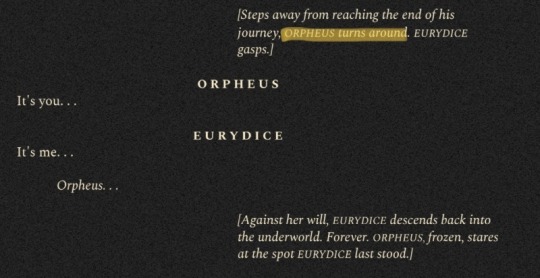
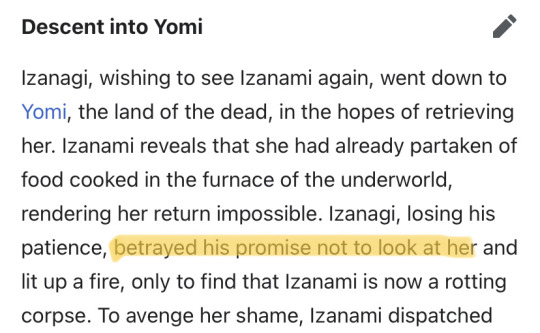

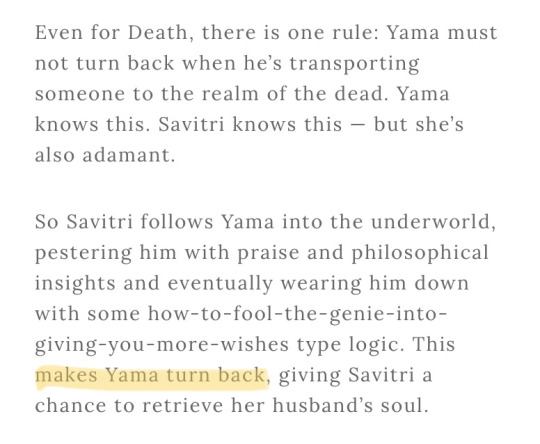
don’t look back
lot and his wife / orpheus and eurydice / inazagi and inazami / haku and chihiro / yama and sivitri
#screaming crying throwing up#don’t look back#hadestown is my favorite musical#and i watched spirited away yesterday#and my local religious trauma means ofc i know lot and his wife#mythology#myths#religion#spirited away#studio ghibli#parallels#web weaving#christianity#greek mythology#vana parva#japanese mythology#hadestown#quotes#bible#mine#orpheus and eurydice
335 notes
·
View notes
Text

#christianity#religion#afterlife#myth of an afterlife#religious nonsense#putting on clown makeup#clown makeup#magical thinking#religion is a mental illness
99 notes
·
View notes
Text
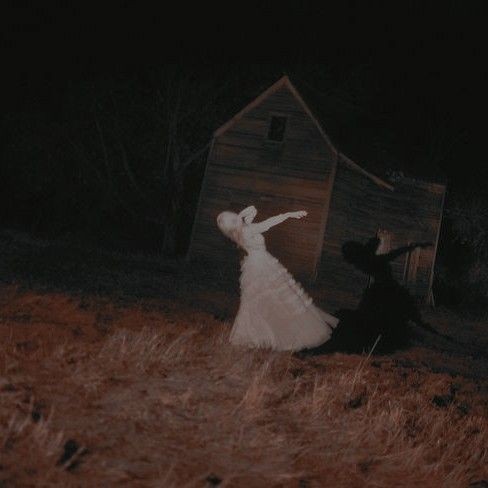






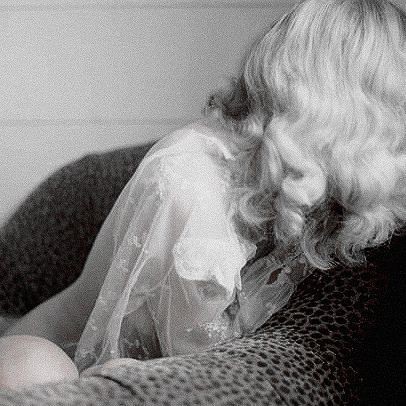

Every book I read in 2023
Comfort Me With Apples by Catherynne M. Valente
★★★★★ / 5
#litedit#comfort me with apples#catherynne m. valente#horroredit#mythedit#myth retelling#religious horror#horror booklr#booktok#booklr#bookstagram#book moodboard#moodboard#horror aes#aes#2023 books*#*bookshelf
79 notes
·
View notes
Text

day 21 - gods / miqo'te pal
From the journal of Estelle de Laussienne, 25th of the 3rd Umbral Moon, 6 7A.E.
Faith has always been a struggle of mine. That's how the Orthodox Church enjoyed it, I think -- that we ought to fight it, fight with it. Strength in victory, victory in combat; when brought low, rise to the battle again. The Fury would not accept one whose faith was never challenged to blows in some arena of the spirit.
Oh, and such blows we all took. Through it all, I wondered -- where is She, then? Surely She was not present when I watched Inquisitors drag my neighbors from their home, as no paragon of warfare would brook the slaughter of innocent non-combatants. And She could not have possibly been there the day my parents burned in dragonfire, either. What honorable soldier ignores the call for aid? What knightly discipline leaves allies to die? It was kinder to believe She wasn't real all these years; I did not want that hate in my heart. That anger.
I'm trying my best.
[roevember 2023 prompt by boreal tempest & roe fizzlebeef]
[roevember 2023 prompt by wintertitania]
#ffxiv#my wol: estelle#roevember#roevemberxiv#roevember 2023#femroe#roegadyn#gpose#my writing#myths of the realm spoilers#endwalker spoilers#completely incidental two-for-one today#the incredibly specific feeling of having a complete crisis of faith surrounded by people who have zero religious trauma
27 notes
·
View notes
Text

MAMA!LOKI 2024 vs. 2021
Did a Tumblr poll and people wanted more wifey!Loki...mama!Loki's kinda the same thing, yea? I am working on more with him and Sigyn, but inspo for this just struck me intensely.
There's a lot of symbolism to unpack here...but for now...behold! Style progression!
#loki#norse loki#lokean#loki deity#myth loki#heathen#norse pagan#paganblr#heathenry#norse paganism#witchblr#norse mythology#norse polytheism#germanic paganism#polytheism#religious art#devotional art#norse heathen#norse gods#rokkatru#thursatru#queer pagan
44 notes
·
View notes